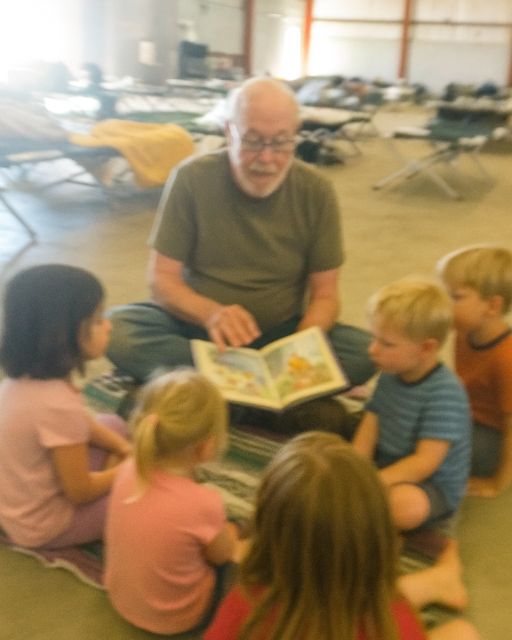I met Walt on day three at the shelter. It was hot, crowded, and smelled like canned beans and wet socks. Everyone was just trying to hold it together after the fire that swept through our neighborhood. Whole blocks gone in hours.
Walt lost his house, his old dog Benny, and the workshop he’d built with his bare hands back in ’78.
He didn’t talk much the first couple days—just sat on his cot and stared at a melted photo frame like he was waiting for it to turn back into something solid.
But then one afternoon, a little girl named Kaylen started crying because her mom had gone back to what was left of their house.
Walt shuffled over, kneeled down with this old children’s book someone had donated, and started reading out loud.
His voice cracked a little, but he kept going.
Within ten minutes, five more kids had formed a circle around him.
By dinner, that circle was ten kids deep.
He hasn’t missed a day since.
Every morning he digs through the donation boxes for a new book, and every afternoon around 4:30, he spreads out that same striped blanket and reads like the world isn’t still burning around us.
Sometimes the books are missing pages.
Sometimes the words are too faded to read.
Doesn’t stop him.
He makes up the missing parts.
Adds funny voices.
Gets the kids giggling so loud that the shelter staff hush them with half-smiles.
They call it “Story Time with Walt” now.
Some parents time their errands around it just so their kids won’t miss it.
He doesn’t ask for anything.
Doesn’t talk about the fire.
Doesn’t talk about Benny.
He just shows up.
The twist?
Yesterday, the director pulled me aside.
She said the city wants to move Walt to a different shelter.
One with “better senior support.”
A cot. Hot meals. A nurse on-site.
“He deserves it,” she said.
And she’s right. He does.
But I looked across the room and saw Walt reading from a tattered copy of The Little Engine That Could,
surrounded by kids who have nothing left but the stories he gives them each day.
And suddenly, it didn’t feel like the move was for him.
It felt like we were about to lose something sacred.
That night, I sat down next to him as he folded the striped blanket.
Told him the city wanted to transfer him.
He didn’t say anything for a while. Just looked at the blanket in his lap.
Then he said, “I haven’t been needed in a long time. These kids? They make me feel like maybe I still matter.”
So this morning, I called the director back.
Told her Walt would go—if the kids could go too.
Not to the senior shelter, of course. But to the library.
The one two blocks from here, the one that offered to open early if we could bring kids by for “structured reading time.”
And guess who they offered to hire—part-time, stipend included, no resume needed?
Walt.
He starts next Monday.
Same time.
Same blanket.
Different walls.
Here’s what I’ve learned:
Sometimes people lose everything.
But in the ashes, they find something they never expected—
a new purpose, a second chance, a reason to show up again.
Walt didn’t rebuild his house.
He rebuilt hope—one page at a time.
If this story meant something to you, share it. Like it if you believe that healing doesn’t always come from being rescued— sometimes it comes from being needed. And if you ever see someone sitting quietly with nothing left… maybe ask what they used to love. You might just help them remember.




